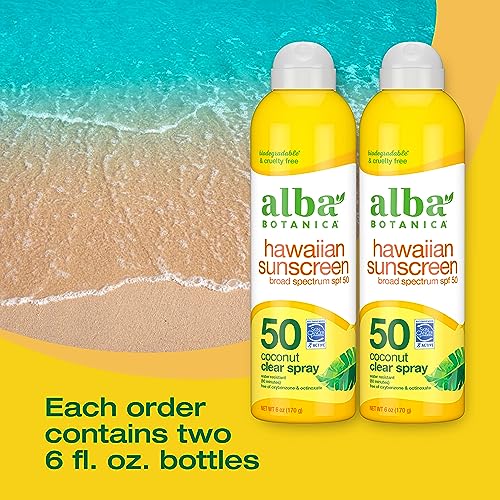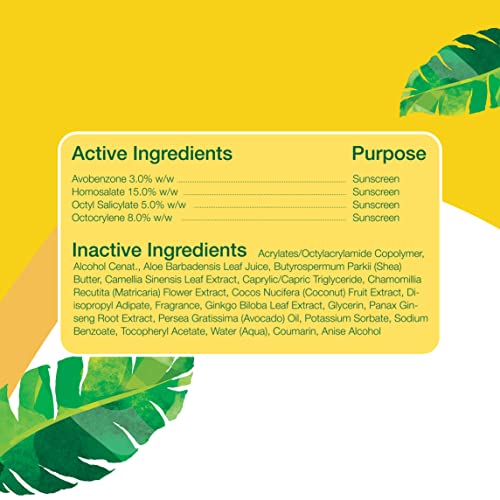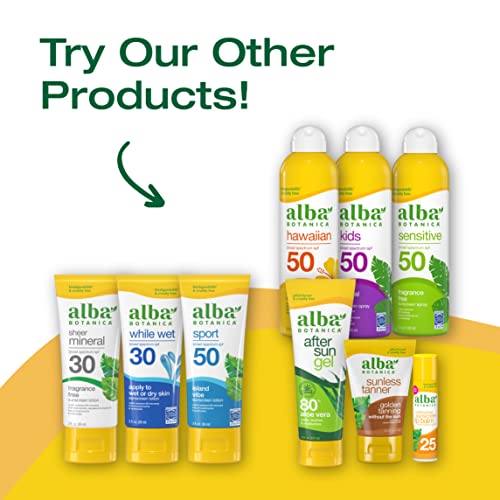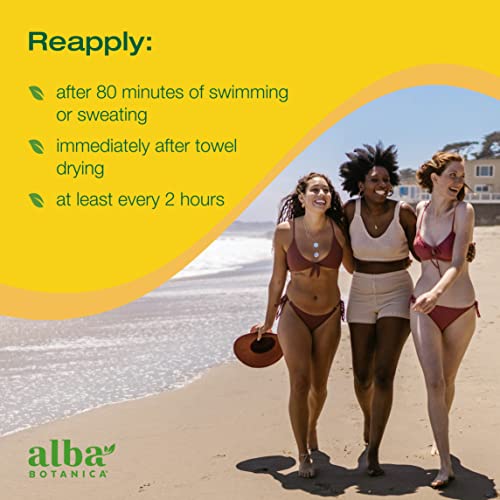




Alba Botanica Sunscreen Spray - Broad Spectrum SPF 50, Water-Resistant, Coconut - 2 Pack, 6oz


Homosalate
Medium RiskHomosalate is a synthetic sunscreen ingredient primarily used in cosmetic formulations to absorb UV radiation, providing protection against sun exposure. It is commonly included in sunscreen products and is known for its effectiveness in enhancing the SPF of formulations.
Sustai Insights
Homosalate functions effectively as a UV filter, contributing to sun protection in cosmetic products. However, it is associated with moderate regulatory restrictions and concerns regarding its potential as an endocrine disruptor, though cancer and allergy risks are considered low. Environmental implications include its status as a pollutant, with some risk of bioaccumulation. Regulatory bodies have issued advisories that warrant caution in usage, leading to an overall moderate risk assessment. Safer alternatives may be available for consumers seeking to minimize exposure to this ingredient.
Octisalate
Medium RiskOctisalate is a weak UVB absorber commonly used in sunscreen formulations to enhance sun protection. It functions by absorbing ultraviolet radiation, thereby preventing sunburn and skin damage. This ingredient is often combined with other UV filters to achieve a broad-spectrum protective effect.
Sustai Insights
Octisalate provides effective UVB protection in sun care products, contributing to skin safety by reducing sunburn risk. Its environmental impact is moderate, with some concerns about its potential as an endocrine disruptor and possible restrictions in specific regions. Health risks are generally low, with low to moderate concerns regarding allergies and immunotoxicity. Regulatory bodies have verified its safe use under certain conditions, leading to an overall moderate risk assessment. For safer alternatives, consider mineral-based UV filters or other approved organic compounds.
Avobenzone
Medium RiskAvobenzone is an organic compound commonly used in sunscreens and skincare products for its ability to absorb ultraviolet (UV) radiation. It provides broad-spectrum protection against UVA rays, helping to prevent skin damage caused by sun exposure. However, it is known to degrade when exposed to sunlight unless stabilized with other ingredients.
Sustai Insights
Avobenzone effectively protects against UVA rays, making it a valuable ingredient in sun care products. However, it has moderate use restrictions due to its instability in sunlight, which can lead to enhanced skin absorption and potential irritation. Regulatory bodies restrict its use in certain formulations, categorizing it as having low concerns for cancer, allergies, and reproductive toxicity. Environmental risks include its potential as a pollutant, though it is not highly bioaccumulative. Overall, the ingredient poses medium risk, and users should adhere to product recommendations for safe application.
Diethylhexyl 2,6 Naphthalate
Low RiskDiethylhexyl 2,6 naphthalate is a phthalate compound primarily used as a plasticizer in various products, enhancing flexibility and durability. It is commonly found in materials such as plastics, adhesives, and coatings, contributing to product performance.
Sustai Insights
Diethylhexyl 2,6 naphthalate serves as an effective plasticizer, improving the workability and longevity of materials. While it has low concerns regarding cancer, allergies, and reproductive toxicity, there are moderate risks related to cumulative exposure from multiple sources. Environmentally, it is not classified as bioaccumulative or a significant pollutant. Regulatory bodies currently do not impose restrictions on its use. Overall, the risk level is considered low, and safer alternatives may include other biodegradable plasticizers.
Homosalate
Medium RiskHomosalate is a synthetic sunscreen ingredient primarily used in cosmetic formulations to absorb UV radiation, providing protection against sun exposure. It is commonly included in sunscreen products and is known for its effectiveness in enhancing the SPF of formulations.
Sustai Insights
Homosalate functions effectively as a UV filter, contributing to sun protection in cosmetic products. However, it is associated with moderate regulatory restrictions and concerns regarding its potential as an endocrine disruptor, though cancer and allergy risks are considered low. Environmental implications include its status as a pollutant, with some risk of bioaccumulation. Regulatory bodies have issued advisories that warrant caution in usage, leading to an overall moderate risk assessment. Safer alternatives may be available for consumers seeking to minimize exposure to this ingredient.
Octisalate
Medium RiskOctisalate is a weak UVB absorber commonly used in sunscreen formulations to enhance sun protection. It functions by absorbing ultraviolet radiation, thereby preventing sunburn and skin damage. This ingredient is often combined with other UV filters to achieve a broad-spectrum protective effect.
Sustai Insights
Octisalate provides effective UVB protection in sun care products, contributing to skin safety by reducing sunburn risk. Its environmental impact is moderate, with some concerns about its potential as an endocrine disruptor and possible restrictions in specific regions. Health risks are generally low, with low to moderate concerns regarding allergies and immunotoxicity. Regulatory bodies have verified its safe use under certain conditions, leading to an overall moderate risk assessment. For safer alternatives, consider mineral-based UV filters or other approved organic compounds.
Diethylhexyl 2,6 Naphthalate
Low RiskDiethylhexyl 2,6 naphthalate is a phthalate compound primarily used as a plasticizer in various products, enhancing flexibility and durability. It is commonly found in materials such as plastics, adhesives, and coatings, contributing to product performance.
Sustai Insights
Diethylhexyl 2,6 naphthalate serves as an effective plasticizer, improving the workability and longevity of materials. While it has low concerns regarding cancer, allergies, and reproductive toxicity, there are moderate risks related to cumulative exposure from multiple sources. Environmentally, it is not classified as bioaccumulative or a significant pollutant. Regulatory bodies currently do not impose restrictions on its use. Overall, the risk level is considered low, and safer alternatives may include other biodegradable plasticizers.
Avobenzone
Medium RiskAvobenzone is an organic compound commonly used in sunscreens and skincare products for its ability to absorb ultraviolet (UV) radiation. It provides broad-spectrum protection against UVA rays, helping to prevent skin damage caused by sun exposure. However, it is known to degrade when exposed to sunlight unless stabilized with other ingredients.
Sustai Insights
Avobenzone effectively protects against UVA rays, making it a valuable ingredient in sun care products. However, it has moderate use restrictions due to its instability in sunlight, which can lead to enhanced skin absorption and potential irritation. Regulatory bodies restrict its use in certain formulations, categorizing it as having low concerns for cancer, allergies, and reproductive toxicity. Environmental risks include its potential as a pollutant, though it is not highly bioaccumulative. Overall, the ingredient poses medium risk, and users should adhere to product recommendations for safe application.
Experience sun protection like never before with Alba Botanica's Hawaiian Coconut Sunscreen Spray. This broad-spectrum SPF 50 sunscreen is a beach essential, offering effective shielding from harmful UV rays while being gentle on your skin and the environment.
- SPF 50 Sun Protection: Recommended by the Skin Cancer Foundation, this water-resistant formula provides reliable defense against UV radiation, keeping your skin safe during outdoor activities.
- Biodegradable & Vegetarian Ingredients: Formulated with 100% vegetarian botanicals, this sunscreen is eco-friendly and biodegradable, aligning with your commitment to sustainability.
- Coconut & Aloe Infusion: Enriched with coconut, aloe vera, and avocado oil, this lightweight spray hydrates your skin, leaving it soft and fragrant without a greasy residue.
- Easy Application: The convenient spray bottle allows for quick application, ensuring even coverage. Simply shake, spray, and rub in for optimal protection.
- Versatile Use: Perfect for beach days or daily wear, this sunscreen is designed for all skin types and can be easily integrated into your sun care routine.
Subscribe & Save with Sustai
- Best Price Guarantee: Always enjoy the lowest prices on sustainable home essentials.
- No Surprises: We’ll notify you before shipping. No hidden fees, ever.
- You’re in Charge: Change, pause, or cancel your subscription anytime with ease.
- Eco-Friendly Deliveries: Our grouped shipments mean less packaging and lower emissions.
Join us on a sustainable journey. Special offers for a limited time! Prices and promotions may change.
Recommended Products
Experience sun protection like never before with Alba Botanica's Hawaiian Coconut Sunscreen Spray. This broad-spectrum SPF 50 sunscreen is a beach essential, offering effective shielding from harmful UV rays while being gentle on your skin and the environment.
- SPF 50 Sun Protection: Recommended by the Skin Cancer Foundation, this water-resistant formula provides reliable defense against UV radiation, keeping your skin safe during outdoor activities.
- Biodegradable & Vegetarian Ingredients: Formulated with 100% vegetarian botanicals, this sunscreen is eco-friendly and biodegradable, aligning with your commitment to sustainability.
- Coconut & Aloe Infusion: Enriched with coconut, aloe vera, and avocado oil, this lightweight spray hydrates your skin, leaving it soft and fragrant without a greasy residue.
- Easy Application: The convenient spray bottle allows for quick application, ensuring even coverage. Simply shake, spray, and rub in for optimal protection.
- Versatile Use: Perfect for beach days or daily wear, this sunscreen is designed for all skin types and can be easily integrated into your sun care routine.

You can have at most 2 Sustainable Steals products in your cart
Customer Reviews
Customers’ View
Customers appreciate the effectiveness and eco-friendly nature of Alba Botanica's Hawaiian Coconut Sunscreen Spray. Many users highlight its lightweight texture and comfortable feel, with one customer noting it doesn't leave a heavy or sticky residue on the skin. The biodegradable formula and cruelty-free aspect resonate well with environmentally conscious consumers, as seen in comments praising its refreshing coconut scent and quick absorption. However, some reviewers have experienced issues with the spray nozzle, mentioning difficulty in usage which detracted from their experience. Overall, customers find this product to be a reliable choice for sun protection, aligning well with their sustainable lifestyle.
AI-generated from the text of customer reviewsThis product is rated 4.8 of 5.0 stars.
It has received 10 reviews.




